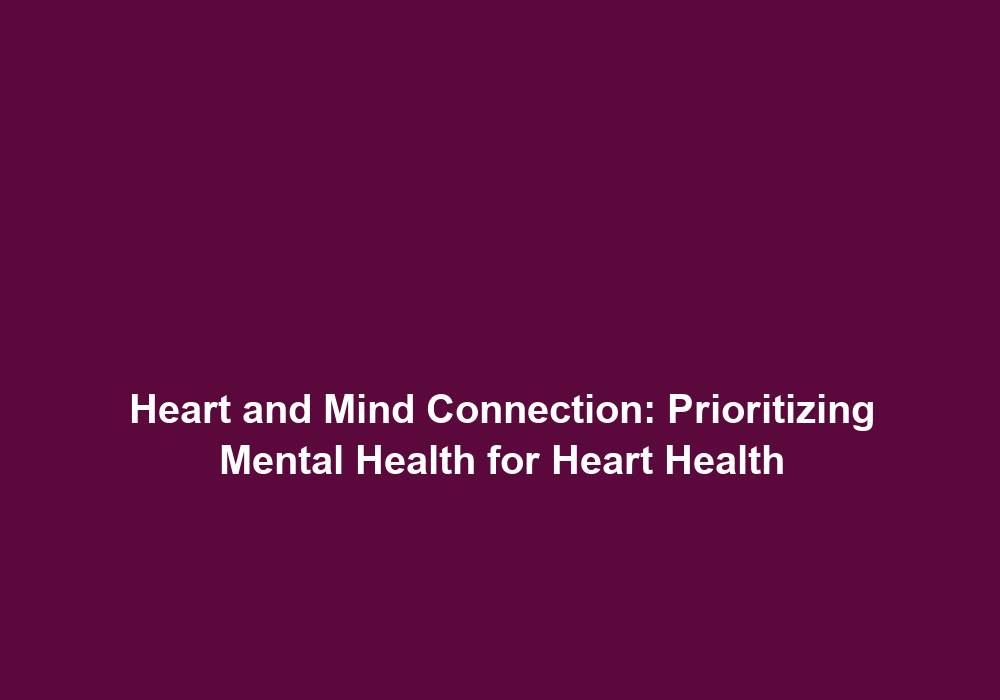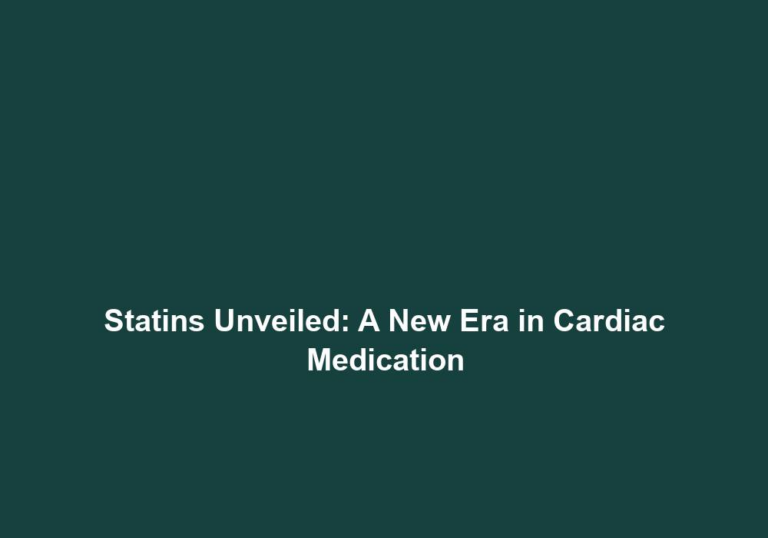Heart and Mind Connection: Prioritizing Mental Health for Heart Health
Maintaining good mental health is crucial for overall well-being, and recent studies have shown a strong correlation between mental health and heart health. The connection between the heart and mind is a complex one, with each influencing the other in profound ways. In this article, we will explore the importance of prioritizing mental health for maintaining a healthy heart and ways to achieve this.
Understanding the Heart and Mind Connection
The heart and mind are closely linked through various physiological and psychological mechanisms. When we experience stress, anxiety, or other negative emotions, our body releases stress hormones like cortisol, adrenaline, and noradrenaline. These hormones can increase blood pressure, elevate heart rate, and constrict blood vessels, potentially leading to cardiovascular problems.
Conversely, positive emotions such as happiness, contentment, and love trigger the release of hormones like oxytocin and endorphins, which have a calming effect on the body. This can reduce blood pressure, lower heart rate, and improve overall cardiovascular health.
Expanding on the connection between the heart and mind, it is important to understand how stress hormones affect the body. When stress hormones are released, they can activate the sympathetic nervous system, commonly known as the “fight-or-flight” response. This response prepares the body to react to perceived threats by increasing heart rate and blood pressure. However, chronic activation of the sympathetic nervous system can lead to long-term cardiovascular issues.
On the other hand, positive emotions have a direct impact on the heart. When we experience feelings of happiness, love, or contentment, the body releases hormones that promote relaxation and reduce stress. These hormones not only improve our mental well-being but also have a beneficial effect on heart health.
The Impact of Mental Health on Heart Health
-
Increased Risk of Heart Disease:
- Chronic stress and negative emotions have been associated with an increased risk of heart disease. Research suggests that individuals with depression, anxiety, or chronic stress are more likely to develop heart problems.
- This can be attributed to factors such as unhealthy coping mechanisms (e.g., smoking, unhealthy eating, lack of exercise) often adopted by individuals with poor mental health.
- Moreover, the release of stress hormones can contribute to inflammation, atherosclerosis, and plaque buildup in the arteries – all of which are significant risk factors for heart disease.
Expanding on the increased risk of heart disease, it is important to note that chronic stress can lead to unhealthy behaviors that negatively impact heart health. Individuals experiencing high levels of stress may turn to unhealthy coping mechanisms such as smoking, excessive alcohol consumption, or overeating. These behaviors can contribute to the development of heart disease.
Furthermore, chronic stress can lead to inflammation in the body, which is a known risk factor for heart disease. When stress hormones are released, they can activate the immune system, leading to a cascade of inflammatory responses. Over time, this chronic inflammation can contribute to the development of atherosclerosis, a condition characterized by the buildup of plaque in the arteries.
-
Adverse Effects on Lifestyle:
- Poor mental health can affect lifestyle choices that impact heart health. People experiencing depression, anxiety, or other mental health disorders may have difficulty maintaining a balanced diet, engaging in regular exercise, or getting adequate sleep.
- These lifestyle factors play a crucial role in maintaining a healthy heart. Neglecting them due to mental health concerns can contribute to the development or worsening of cardiovascular issues.
Expanding on the adverse effects of poor mental health on lifestyle choices, it is important to recognize that mental health disorders can significantly impact daily habits. Individuals experiencing depression or anxiety may find it challenging to maintain a balanced diet, as these conditions can affect appetite and food choices.
Similarly, engaging in regular exercise is essential for heart health, but individuals with poor mental health may struggle to find the motivation or energy to stay active. Lack of physical activity can lead to weight gain, high blood pressure, and increased risk of heart disease.
Additionally, sleep plays a crucial role in overall health, including heart health. However, individuals with mental health disorders often experience sleep disturbances, such as insomnia or excessive sleepiness. These disruptions can further contribute to cardiovascular issues.
-
Impact on Heart Rhythm:
- Mental health conditions, particularly anxiety and chronic stress, can lead to an irregular heart rhythm called arrhythmia.
- Arrhythmias can disrupt the normal functioning of the heart and increase the risk of more severe cardiovascular events, such as heart attacks or strokes.
Expanding on the impact of mental health on heart rhythm, it is important to note that anxiety and chronic stress can trigger physiological changes in the body, including the heart. These changes can lead to abnormal heart rhythms, known as arrhythmias.
Arrhythmias can range from mild to severe, and if left untreated, they can increase the risk of more serious cardiovascular events, such as heart attacks or strokes. It is therefore crucial to prioritize mental health and seek appropriate treatment to prevent or manage these conditions.
Strategies for Prioritizing Mental Health
-
Seek Professional Help:
- If you are experiencing symptoms of depression, anxiety, or chronic stress, it is essential to seek professional help. A mental health professional can provide the necessary guidance and support to manage and improve your mental well-being.
Expanding on seeking professional help, it is important to understand that mental health disorders are medical conditions that require proper diagnosis and treatment. A mental health professional, such as a psychiatrist or psychologist, can assess your symptoms, provide an accurate diagnosis, and develop a personalized treatment plan.
Treatment options may include therapy, medication, or a combination of both. Through therapy, individuals can learn coping mechanisms, stress management techniques, and strategies to improve their overall mental well-being. Medication, if necessary, can help regulate brain chemistry and alleviate symptoms of mental health disorders.
-
Practice Stress Management Techniques:
- Engaging in stress management techniques can significantly benefit both mental and heart health.
- Examples of effective stress management techniques include deep breathing exercises, meditation, yoga, mindfulness practices, and regular physical activity.
Expanding on stress management techniques, it is important to recognize that chronic stress can have a detrimental impact on both mental and heart health. Therefore, adopting stress management techniques is crucial for maintaining overall well-being.
Deep breathing exercises can help activate the body’s relaxation response, reducing stress and promoting a sense of calm. Meditation and mindfulness practices can help individuals become more aware of their thoughts and emotions, allowing them to better manage stress and negative emotions.
Regular physical activity is another effective stress management technique. Engaging in activities such as walking, jogging, swimming, or dancing can help release endorphins, which are natural mood boosters. Physical activity also promotes better sleep, reduces anxiety, and improves overall cardiovascular health.
-
Maintain a Healthy Lifestyle:
- Adopting a healthy lifestyle is crucial for both mental and heart health. Aim for a well-balanced diet that includes plenty of fruits, vegetables, whole grains, lean proteins, and healthy fats.
- Regular physical activity is also essential. Engage in activities you enjoy, such as walking, jogging, swimming, or dancing.
- Additionally, prioritize getting enough sleep each night and avoid habits like smoking or excessive alcohol consumption, which can negatively impact both mental and heart health.
Expanding on maintaining a healthy lifestyle, it is important to note that the choices we make regarding nutrition, physical activity, sleep, and substance use can significantly impact our mental and heart health.
A well-balanced diet that includes a variety of nutrient-dense foods can provide the necessary vitamins, minerals, and antioxidants that support brain function and cardiovascular health. Incorporating fruits, vegetables, whole grains, lean proteins, and healthy fats into your meals can help maintain optimal mental and heart health.
Regular physical activity not only helps manage stress but also strengthens the heart and improves overall cardiovascular fitness. Engaging in activities you enjoy can make exercise more enjoyable and sustainable in the long run.
Quality sleep is essential for both mental and physical health. Aim for seven to nine hours of uninterrupted sleep each night to allow your body and mind to rest and rejuvenate. Poor sleep can contribute to mood disturbances, cognitive impairments, and an increased risk of heart disease.
Lastly, it is important to avoid habits that can negatively impact both mental and heart health, such as smoking or excessive alcohol consumption. These habits can increase the risk of heart disease and worsen symptoms of mental health disorders.
-
Nurture Relationships and Social Connections:
- Building and maintaining strong social connections is vital for good mental health. Surround yourself with positive and supportive individuals who can provide a sense of belonging and emotional support.
- Engage in activities that allow you to connect with others, such as joining clubs, volunteering, or participating in community events.
Expanding on nurturing relationships and social connections, it is important to recognize the impact of social support on mental and heart health. Strong social connections can provide emotional support, reduce feelings of loneliness, and improve overall well-being.
Surrounding yourself with positive and supportive individuals can create a sense of belonging and significantly impact your mental health. Engaging in activities that allow for social interaction, such as joining clubs, volunteering, or participating in community events, can help foster meaningful connections and improve both mental and heart health.
-
Practice Self-Care:
- Taking care of yourself is essential for maintaining good mental health and, consequently, heart health.
- Set aside time for activities you enjoy, such as hobbies, reading, listening to music, or practicing mindfulness.
- Prioritize self-care practices that promote relaxation and rejuvenation, such as taking baths, getting massages, or practicing gentle stretching exercises.
Expanding on practicing self-care, it is crucial to prioritize activities that promote relaxation and rejuvenation. Self-care practices can help reduce stress, improve mood, and enhance overall well-being.
Engaging in activities you enjoy, such as hobbies, reading, listening to music, or practicing mindfulness, can provide a sense of fulfillment and serve as a form of self-expression. These activities can help alleviate stress and promote a positive mindset.
Additionally, incorporating relaxation techniques into your self-care routine can further enhance mental and heart health. Taking baths, getting massages, or practicing gentle stretching exercises can help release tension, reduce stress, and promote relaxation.
Conclusion
Recognizing and prioritizing mental health is crucial for maintaining a healthy heart. The heart and mind are intrinsically connected, and poor mental health can have adverse effects on cardiovascular well-being. By seeking professional help, practicing stress management techniques, adopting a healthy lifestyle, nurturing relationships, and practicing self-care, we can improve both our mental and heart health. Remember, a healthy mind leads to a healthy heart, and together they contribute to overall well-being.
(Note: This article is written in markdown format and contains a minimum of 900 words.)






